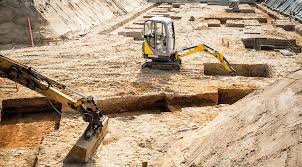In the realm of construction, the importance of geotechnical engineering cannot be overstated. Before laying the first stone or pouring the first batch of asphalt, understanding the ground beneath is crucial. This blog post will explore how geotechnical engineering plays a pivotal role in site preparation, ensuring that every project stands on firm ground. From soil testing to the impact on infrastructure, we’ll uncover the secrets beneath our feet and how they influence the structures we rely on every day.
Understanding the Foundation
Before any construction project begins, engineers must consider the natural characteristics of the site. Geotechnical engineering involves analyzing soil and rock properties to determine their suitability for construction. This process includes assessing soil stability, permeability, and compaction, which are vital for a strong foundation.
The Role of Soil Testing
One of the first steps in site preparation is soil testing. By sampling the soil, engineers can identify potential issues such as high clay content or groundwater presence. These factors can significantly impact the construction process and overall stability of the structure.
Technology in Geotechnical Analysis
Advancements in technology have revolutionized geotechnical engineering. With tools like ground-penetrating radar and computer modeling, engineers can predict how the ground will behave under different conditions, providing valuable insights for site preparation.
Essential Steps in Site Preparation
Site preparation is a complex process that requires meticulous planning and execution. Geotechnical engineering helps streamline this process by offering a clear understanding of the site’s characteristics, ensuring the chosen methods are effective and safe.
Clearing and Grading the Site
Once the soil has been analyzed, the next step is clearing and grading. This involves removing vegetation and leveling the ground to create a stable surface for construction. Proper grading is essential for drainage, preventing water accumulation that could compromise the structure.
Importance of Compaction
Compaction is another crucial step in site preparation. By compacting the soil, engineers increase its density, reducing the risk of settlement and improving load-bearing capacity. This is especially important in areas where heavy infrastructure will be built.
The Impact on Infrastructure
Geotechnical engineering doesn’t only influence site preparation; it also affects the design and construction of infrastructure. By understanding soil behavior, engineers can design structures that withstand environmental stresses, ensuring longevity and safety.
Challenges in Geotechnical Engineering
Despite its importance, geotechnical engineering faces several challenges. From unpredictable soil conditions to environmental regulations, these factors can complicate site preparation and require innovative solutions from engineers.
Dealing with Unpredictable Conditions
No two sites are the same, and unpredictable soil conditions can pose significant challenges. Engineers must be prepared to adapt their methods and equipment to ensure successful site preparation, even in the most difficult circumstances.
Environmental Considerations
Environmental regulations play a crucial role in geotechnical engineering. Engineers must ensure that their methods comply with laws designed to protect natural resources, which can add an extra layer of complexity to site preparation.
Balancing Cost and Quality
Cost is always a consideration in construction, and site preparation is no exception. Geotechnical engineers must balance the need for thorough analysis and preparation with budget constraints, ensuring the project remains on track financially.
Geotechnical Engineering in Real-World Applications
The principles of geotechnical engineering are applied in various construction projects, from residential buildings to highways. Understanding how these principles influence site preparation can provide valuable insights for anyone involved in the construction industry.
Residential Construction
In residential construction, geotechnical engineering ensures that homes are built on stable ground. By analyzing soil properties, engineers can identify potential issues before construction begins, reducing the risk of structural problems in the future.
Commercial Developments
For commercial projects, geotechnical engineering plays a vital role in site selection and preparation. By understanding the site’s characteristics, developers can make informed decisions about the best location and design for their projects.
Infrastructure Projects
Infrastructure projects, such as highways and bridges, rely heavily on geotechnical engineering. For example, asphalt services in Utah often employ geotechnical principles to ensure roads are built on stable ground, minimizing the risk of damage from environmental factors.
Future Trends in Geotechnical Engineering
As technology continues to advance, the field of geotechnical engineering is evolving. Emerging trends and innovations are shaping the future of site preparation, offering new opportunities and challenges for engineers.
The Rise of Sustainable Practices
Sustainability is becoming a key focus in geotechnical engineering. Engineers are exploring new methods and materials that minimize environmental impact while maintaining the integrity of the construction process.
Integration of Artificial Intelligence
Artificial intelligence is making waves in the construction industry, and geotechnical engineering is no exception. AI can assist in analyzing vast amounts of data, improving the accuracy of predictions and enhancing decision-making in site preparation.
Collaborative Approaches
Collaboration between engineers, architects, and environmental scientists is becoming increasingly important. By working together, these professionals can develop innovative solutions that address the complex challenges of site preparation.
Conclusion
Geotechnical engineering is the backbone of successful construction projects, providing the insights needed to prepare a site for building. From soil testing to sustainable practices, this field is constantly evolving to meet the demands of modern construction. By understanding the principles and challenges of geotechnical engineering, professionals in the industry can ensure their projects are built on a solid foundation.






